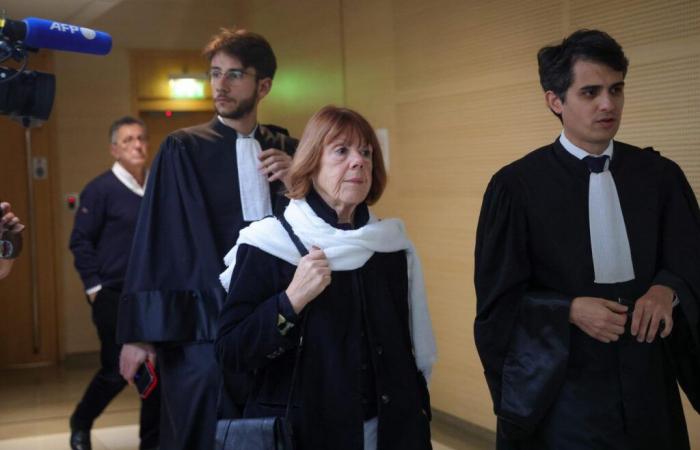It is now the final stretch in this long trial. This Wednesday, November 20, the floor will be given to Gisèle Pelicot's lawyers. Then, from Monday, it will be the indictment of the prosecution, scheduled to last three days. Then, for three weeks, the departmental criminal court will hear the pleadings of the lawyers of the 51 accused.
The verdict should be delivered on December 20, after the five professional magistrates making up the court have retired for a week to deliberate. It is therefore the final stretch and the last words on the stand for Gisèle Pelicot. “It’s time we change our outlook on rape,” she said this Tuesday, November 19, emphasizing that this trial will remain like that of a “macho and patriarchal society that trivializes” sexual assault.
A “courageous” decision
Started at the beginning of September, this trial will be a landmark. Firstly because of the number of accused, these fifty men suspected of having raped Gisèle Pelicot when she had been drugged and put to sleep by her husband. A trial “historical” also because of the scale it has taken on in the public sphere with these multiple debates on sexual violence, masculinity or the crucial question of consent.
A scale which would not have been the same without the decision taken by Gisèle Pelicot to refuse to allow the hearing to take place behind closed doors, far from the gaze of journalists and the public. “This decision was very courageous and extremely powerful. This trial would never have provoked such a social debate if the debates had not been public. greets Me Maria Cornaz Bassoli, lawyer in Paris and president of Choosing the Cause of Women, an association co-founded by Gisèle Halimi.
Between these two women, the victim of Mazan and the feminist lawyer, there is a continuity of combat. Questioned at the hearing on October 23, Gisèle Pelicot expressed her refusal of closed session by affirming her ” will “ and its “ determination to change this society.” And so that the shame changes sides, that it no longer weighs on the shoulders of the victims. “The shame is not ours to have, it’s theirs (the accused),” she added.
Words which echoed those made by Gisèle Halimi more than forty years ago. “In matters of rape, we, in our movement, insist on publicity of the debates because we believe that the woman victim should not feel guilty and that she has nothing to hide,” the lawyer then affirmed before another historic trial: that of 1978 in Aix-en-Provence where three men were tried (1) accused of having raped two women, Anne Tonglet and Araceli Castellano, who also refused to be detained in court. closed.
“We think it is one thing for a man to rape and another thing is to want it to be known in his village, in his work, in the newspapers. Advertising can act as a deterrent,” then estimated Mr. Halimi.
“Shame must change sides”
Before this trial, rape trials systematically took place behind closed doors. Thanks to the impact of the Aix-en-Provence hearing, a law was passed in 1980 to allow the decision whether or not to authorize the publicity of the proceedings to be left to the sole discretion of the victim. “Since this law, only the victim can request or refuse publicity of the proceedings”, Please Me Cornaz Bassoli.
But should the proceedings be public in a rape case? “It’s up to the victim to decide without imposing anything on them. Some women tell me straight away: I don't want closed doors because the shame has to change sides. And others tell me: I don't want there to be the public and the media at the trial”, explains Me Carine Durrieu-Diebolt, who defends many victims of sexual violence.
“Every time, it’s case by case. Some women fear that they will not be comfortable recounting the facts if there are people in the audience. Sometimes, too, they are afraid of public pressure.” adds the lawyer, who remembers a trial where she assisted a woman victim of gang rape in Corsica. “This woman was from the Paris region and she feared that during this hearing, far from home, many people would come to support the accused. She therefore requested a closed session. »
“Nothing should be imposed on a victim”
Me Durrieu-Diebolt is also the lawyer for two women who accuse Gérard Depardieu of sexual assault. At the end of October, they wanted a public debate during the criminal hearing in Paris, ultimately postponed to March due to the actor's absence for medical reasons. “For her, it was important that the media were there to report on the debates, tell what they experienced and transcribe everything that Gérard Depardieu was going to say in his defense. »
If they greet the « courage » by Gisèle Pelicot, these two lawyers insist on the importance, after the Avignon trial, that each victim feels free to choose or not to choose behind closed doors for the trial concerning them. Without obligation to act like the icon that Gisèle Pelicot has become.
“There cannot be an injunction against the closed session. Nothing should be imposed on a victim,” Estimate Me Cornaz Bassoli. “A victim who refuses the publicity of the proceedings is no less courageous and determined than those who request a closed session”, adds Me Durrieu-Diebolt.
(1) One was sentenced to six years in prison, the other two to four years.






